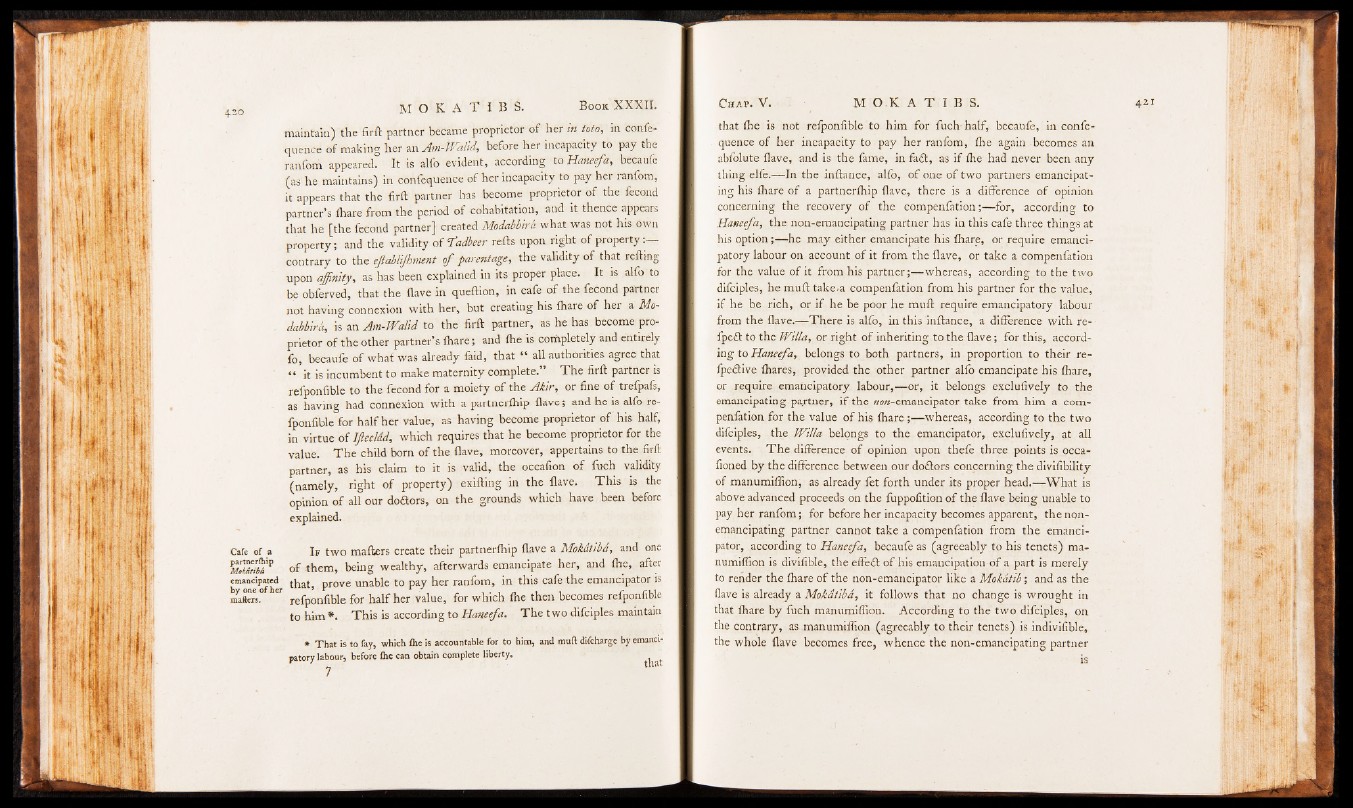
Cafe o f a
partnerfhip
Mokdtiba
emancipated
by one o f her
m afters.
maintain) the firft partner became proprietor of her in toto, in confe-
quence of making her an Hm-PValid, before her incapacity to pay the
ranfom appeared. It is alfo evident, according to Haneefa, becaufe
(as'he maintains) in conference of her incapacity to pay her ranfom,
it appears that the firft partner has become proprietor of the fecond
partner’s fhare from the period of cohabitation, and it thence appears
that he [the fecond partner] created Modabbirb. what was not his own
property; and the validity of I ’adbeer refts upon right of property:
contrary to the eftablijhment o f parentage, the validity of that reftmg
upon affinity, as has been explained in its proper place. It is alfo to
be obferved, that the Have in queftion, in cafe of the fecond partner
not having connexion with her, but creating his fhare of her a Mo-
dabbira, is an Am-Walid to the firft partner, as he has become proprietor
of the other partner’ s fhare; and fhe is completely and entirely
fo, becaufe of whaf was already faid, that “ all authorities agree that
“ it is incumbent to make maternity complete.” The firft partner is
refponfible to the fecond for a moiety of the M ir , or fine of trefpafs,
as having had connexion with a partnerfhip fldve ; and he is alfo refponfible
for half her value, as having become proprietor of his half,
in virtue of JJieeldd, which requires that he become proprietor for the
value. The child born of the flave, moreover, appertains to the firft
partner, as his claim to it is valid, the occafion of fuch validity
(namely, right of property) exifting in the flave. T h is is the
opinion of all our dodtors, on the grounds which have been before
explained.
I f two mafters create their partnerfhip flave a Mokdtiba, and one
of them, being wealthy, afterwards emancipate her, and fhe, after
that, prove unable to pay her ranfom, in this cafe the emancipator is
refponfible for half her value, for which fhe then becomes r e fp o n f ib le
to him *. This is according to Haneefa. The two difciples maintain
* T h a t is to fay, which file is accountable for to him, and muft difcharge by emancipatory
labour, before fhe can obtain complete liberty. ^ at
that fhe is not refponfible to him for fuch- half, becaufe, in confe-
quence of her incapacity to pay her ranfom, fhe again -becomes an
abfolute flave, and is the fame, in fadt, as if fhe had never been any
thing elfe.— In the inftance, alfo, of one o f two partners emancipating
his fhare o f a partnerfhip flave, there is a difference of opinion
concerning the recovery o f the compenfation—for, according to
Haneefa, the non-emancipating partner has in this cafe three things at
his option;— he may either emancipate his fhare, or require emancipatory
labour on account of it from the flave, or take a compenfation
for the value of it from his partner;— whereas, -according to the two
difciples, he muft take.a compenfation from his partner for the value,
if he be rich, or if he be poor he muft require emancipatory labour
from the flave.— There is alfo, in this inftance, a difference with re-
fpedt to the Willa, or right of inheriting to the flave; for this, according
to Haneefa, belongs to both partners, in proportion to their re-
lpective fhares, provided the other partner alfo emancipate his fhare,
or require emancipatory labour,— or, it belongs exclufively to the
emancipating partner, if the »««-emancipator take from him a com-
penfatiorr for the value of his fhare ;— whereas, according to the two
difciples, the Willa belongs to the emancipator, exclufively, at all
events. T h e difference of opinion upon thefe three points is occa-
fioned by the difference between our doctors concerning the divifibility
of manumiflion, as already fet forth under its proper head.— What is
above advanced proceeds on the fuppofition o f the flave being unable to
pay her ranfom; for before her incapacity becomes apparent, the nonemancipating
partner cannot take a compenfation from the emancipator,
according to Haneefa, becaufe as (agreeably to his tenets) manumiflion
is divifible, the effedt of his emancipation of a part is merely
to render the fhare of the non-emancipator like a Mok&tib; and as the
flave is already a Mokdtiba, it follows that no change is wrought in
that fhare by fuch manumiflion. According to the two difciples, on
the contrary, as manumiflion (agreeably to their tenets) is indivifible,
the whole flave becomes free, whence the non-emancipating partner